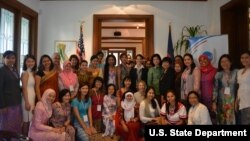“Women’s rights in the ASEAN Member States have seen significant progress in the last five years,” said United States Ambassador to the Association of Southeast Asian Nations Ambassador Nina Hachigian.
Speaking at the Opening Dinner inaugurating U.S. – ASEAN Women’s Leadership Academy for YSEALI [Young Southeast Asian Leaders Initiative] in Jakarta, Indonesia, on October 17th, the Ambassador noted:
“Data shows that there has been greater access to education, an increase in life expectancy and a decrease in women dying during childbirth. More women in Indonesia, Malaysia, Thailand, Vietnam, and the Philippines are enrolling in higher education programs. That said, many obstacles remain that are preventing women’s equal participation in and benefit from ASEAN economic growth and development.”
The empowerment of women, she said, is an important development issue. “According to the International Labor Organization, women’s work, both paid and unpaid, may be the single most important poverty-reducing factor in developing economies,” said Ambassador Hachigian.
“Studies have shown repeatedly that women are more likely to invest a large proportion of their household income in the education of their children, increasing opportunity for the next generation. It’s not that men don’t care for their families–they do–but men dedicate less of their wages to their children’s health and education than women do.
“Similar benefits come from increasing women’s access to education. Educated women are better at managing their own and their family’s health issues, thereby reducing infant and maternal mortality, as well as health-care costs. A study using data from 219 countries from 1970 to 2009 found that, for every one additional year of education for women of reproductive age, child mortality decreased by nearly 10 percent.”
Ambassador Hachigian cited a recent UN Women report that concluded that, in the Asia-Pacific region alone, removing barriers to full participation of women in the workforce could boost GDP by $89 billion U.S. every year.
“It’s clear when societies engage, train and invest in women, the broader community benefits, she said. “So for all these reasons, one of my top priorities as U.S. Ambassador to ASEAN is to promote opportunities for women in ASEAN. As we would say in the US: it’s a ‘no-brainer.’ Meaning, it’s the obvious choice.”














